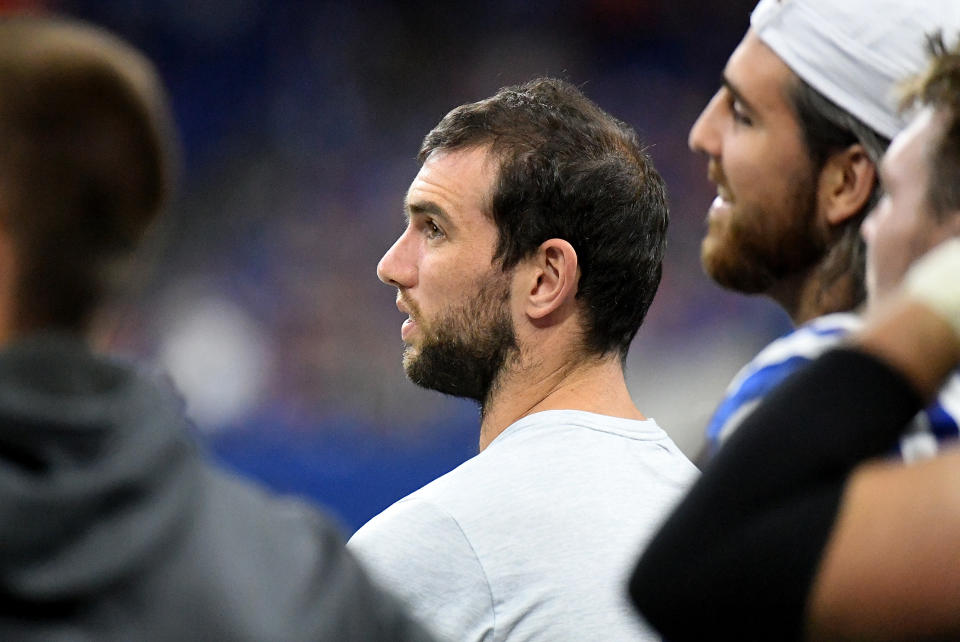Years of exhaustion in Andrew Luck’s football life forced him to carry out a vow
The fans booed because they are fans and all they really ever care about is their team winning. The term is short for fanatic, after all.
The fans booed because word had spread that Andrew Luck was retiring, and so as he walked off the Lucas Oil field Saturday night, so too went a higher probability that the Indianapolis Colts would contend for a Super Bowl this season. Or maybe for many seasons.
The fans booed and Luck heard them and, well, no, this wasn’t what he was envisioning for his curtain call in Indy, not in 2012 when he was the No. 1 overall pick and replacement for Peyton Manning, not in the 2014 season when he led the Colts to the AFC championship game, not even earlier that night when he knew he was done.
“It hurt,” Luck said. “I’ll be honest. It hurt.”
[Watch live local and prime-time NFL games free on your phone with the Yahoo Sports app.]
Luck heard the fans but he was retiring because he was done listening to the fans, or the coaches, or the media, or the general consensus about how and for how long a football player should play football.
Just about everyone else in the history of the game plays until they are told they can’t play anymore. Maybe that’s getting cut from the junior varsity. Maybe that’s after an 18-year NFL career.

Until then, they cling to the belief that you play as long as they will let you because playing a so-called “kid’s game” is a blessing of some sort and that blessing should never be disrespected.
Yet here was Luck, just 29 years old, calling it quits not so much because of what the injuries he suffered in pursuit of football – this ultimate American sport – did to him physically, but what they were doing to him, and threatening to continue doing to him, emotionally and mentally.
“I haven’t been able to live the life I want to live,” he said.
What a statement. What an astoundingly powerful and personal statement. It is one of the most profound, honest and open things anyone has ever said at a retirement news conference.
Football had given him fame and fortune, given him purpose and pride. It had been his life. He loved it. He absolutely loved it. Yet through the recurring cycle of injuries and rehab, of hopes dashed and frustrations mounted, Andrew Luck had found it wasn’t much of a life anymore.
“I’ve been stuck in this process,” Luck said. “... It’s taken the joy out of this game. After 2016 when I played in pain, and wasn’t regularly able to practice, I made a vow I wouldn’t go down that path again. The only way forward is to remove myself from this cycle. I came to the proverbial fork in the road, and made a vow if I ever did again I would choose me, in a sense.”
Who knows exactly how dark things had gotten for Luck during that time, during any of these times, but he sounded not like a guy who was giving up football but like a guy who was giving up drinking, or drugs, or some other abusive lifestyle he knew he couldn’t continue with. He sounded like someone coming clean.
“A moment of clarity,” he described it.
We’ve seen generations of men who pushed and pushed to play football until the final, bitter end. The fans and media see only the Sunday product, the guy either back out on the field throwing touchdowns to a cheering stadium, or his name inked on the injured list.
It’s the middle that can chew them up and spit them out with more ferocity and lasting impact than the hardest hitting of linebackers.
How many shots of Toradol have doomed players long after their playing days? How many have left the game dealing with dependency issues, with depression, with rage, with anger filling in the emptiness of it all?
How many former players have we seen become wrecks, with suicides and reckless behavior, bankruptcies and estranged families. It’s not all CTE. It’s a sliding scale. How much devastation, big or small, could have been avoided by paying attention and pumping the breaks earlier?
There is no telling where exactly Luck was on that. There’s no telling how at risk he was ... or believed he was.
It’s clear he looked in the mirror of late and said enough, that whatever the outside world thought was a reasonable sacrifice to play the game, was actually in the process of eating him alive.
“I feel exhausted,” he said. “And quite tired.”
He’s not the first in football and certainly not the first in life. People walk away from lucrative careers on Wall Street or as trial attorneys, walk from stress-filled jobs as police officers and firefighters, because they realize that what once seemed so appealing was now getting in the way of real happiness and fulfillment.
That the job had consumed their life, the life that they wanted to live.
Money won’t buy you happiness but it can buy you freedom, and so Luck, with all his millions, exercised his. Maybe he’s done for good. Maybe he just needs a break. Who knows for sure.
It sure sounded like he has seen not just what football can do to you, but what it allows you to do for yourself.
And then he decided that he no longer wanted to risk playing that game.
The fans booed. Of course they did. They are fans. But that noise that filtered down onto Andrew Luck was fitting as it perfectly represented the misunderstood mentality that he was running from in the first place.
More from Yahoo Sports:

